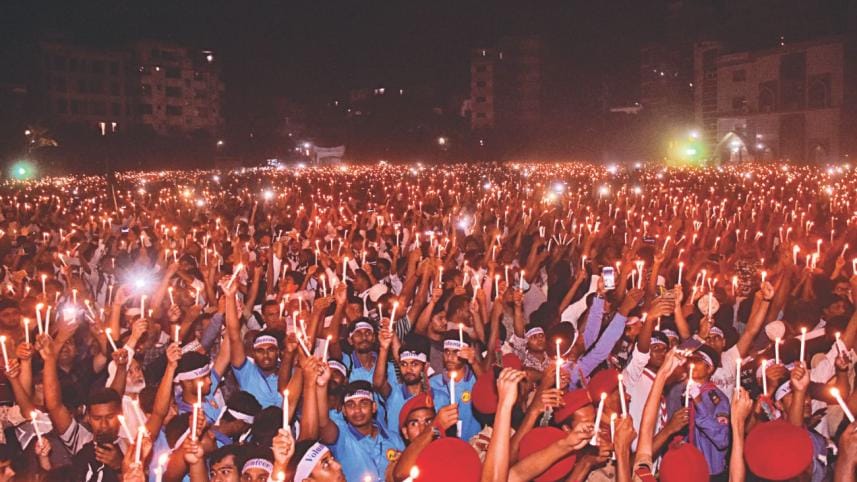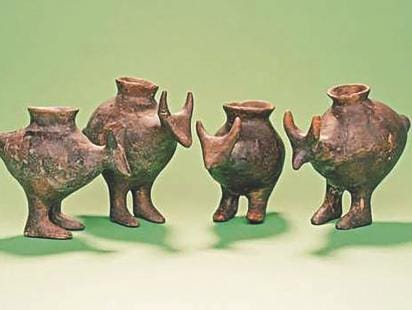Independence Day Today: THE NORTHERN UPRISING


The resistance during the 1971 Liberation War began in Rangpur early March and it was a full-on war even before the black night of March 25.
Rangpur was tense after Sarfaraj Khan, a non-Bangalee, had shot 12-year-old Shanku Samajdar dead in the town on March 3.
A curfew was imposed, but the people of Rangpur defied it and continued protesting the murder.
Bangabandhu Sheikh Mujibur Rahman's historic March 7 Speech boosted their morale as it touched upon Rangpur and other places where people laid down their lives.
Bangabandhu, at one point of his fiery speech, said, “You will have to face the enemy with whatever you have.”
This was a clear directive for freedom fighters in Rangpur, including Mojibar Rahman, who was one of the organisers of the historic siege to Rangpur Cantonment.
Well before March 26, the people in the district started to put up the resistance.
A number of men, including former AL leader Siddique Hossain, lawyer Abdul Goni, Sheikh Amzad Hossain, Taibur Rahman and Mojibar Rahman, teamed up.
As per Bangabandhu's directive, they formed an all-party Sangram Parishad, excluding members from the Jamaat-e-Islami and the Muslim League.
They held meetings in villages to organise the movement.
Although they had no weapons, the desperate time called for a desperate measure.
Mojibar said Mollah Master of Mahiganj used to supply food to the cantonment. “We contacted him and asked him to stop the supply and Mollah agreed.”
With the pantry empty, Pakistan army men started going to localities in search of food.
“Bangalees were angry as the jawans took their food without paying,” Mojibar told The Daily Star a few days ago.
On March 24 in 1971, Pakistan army Capt Abbasi along with three jawans and a driver went to Damadarpur (Sammanipur) village to take villagers' food.
Shahed Ali, a young butcher of the village, led a surprise attack on the Pak soldiers with the help of villagers. He stabbed Abbasi, who died of his wounds later.
The Pakistan army retaliated by torching nearby villages and opening fire. This left several people injured.
An ongoing curfew was beefed up.
After the black night of March 25, the freedom fighters communicated with Nawajesh, a Bangalee captain in the cantonment.
“We learnt that the Bangalee jawans outnumbered the Pakistani jawans in the cantonment,” recalled Mojibar.
He quoted Nawajesh as saying, “If the Bangalee jawans help, it will be possible for us to arm the freedom loving-people with weapons and ammunition.”
The freedom fighters then held meetings in villages to organise a siege to the Rangpur Cantonment.
“We thought it would be easy to take part in the Liberation War if we were able to take the arms and ammunition from the cantonment,” said Mojibar.
As per the plan with Capt Nawajesh, thousands of villagers of Mithapukur, Baldhipukur, Badarganj, Ranipukur, Manzail, Tampat, Palichara, Ramjiban, Bongaon, Burihat, Haragachh, Gangachara, Shyampur, Damdama, Lalbag, Goneshpur, Damadarpur, Dewdoba, Pathanpara, Paglapir, and Taraganj of Rangpur gathered on the bank of the Ghagat river around noon on March 28.
Indigenous people came with their traditional weapons -- bows and arrows.
Nuhash Kerketa, 75, a Santal man who took part in the siege on March 28, said, “We left our village [Baldipukur] around 10:00am and arrived in Nishbetganj village near the Ghagat around 1:00pm.”
Mojibar said, “Before we launched our attack, we had held a brief meeting right there.”
As the people approached the cantonment, the army men fired shots in the air.
“We thought the Bangalee members of the EPR [East Pakistan Rifles] opened fire to receive us, as per our discussion with Capt Nawajesh the day before,” he said.
But things did not go as planned.
Pakistani army men came out of the cantonment and mowed down freedom fighters with gunfire. “More than 1,500 people were killed on the spot,” Mojibar said.
At least 500 bodies were burnt with petrol on the bank of the Ghagat, said the 82-year-old.
The people had no idea that the Pakistan army personnel knew about their plans as there was a mole among the Bangalee army men in the cantonment. They later learnt that the Pakistani army men captured the Bangalee jawans and that Capt Nawajesh had to flee.
Maj Nasir Uddin, who was at the Rangpur Cantonment during the incident, in his book Juddhey Juddhey Swadhinata said around 10 Jeeps went out of the cantonment. Within five minutes, the unarmed people were silenced by a hail of gunfire.
In the book, he mentioned that 500 to 600 bodies were burnt with petrol.
Dogs, foxes, and vultures ate many bodies, said Somra Singh of Pachchapara village in Rangpur's Mithapukur upazila.
The killings did not stop that day. The Pakistani army men killed 11 people at Rangpur Central Crematory and 32 more in Lahirihat area on April 3 and May 7.
In memory of the lives lost in the siege, a monument -- Rakta Gourab -- was built in Nishbetganj village in 2002. The people of Rangpur observe March 28 as Rangpur Cantonment Siege Day every year.
Those who directly took part in the cantonment siege urge the government to observe the day officially and recognise them as freedom fighters.
Sadrul Alam Dulu, a freedom fighter of Rangpur, said people in the district started their Liberation War by killing Capt Abbasi on March 24.
Meanwhile, the investigation agency of the International Crimes Tribunal in October last year said it had evidence against Oahidul Haque, 69, in connection with his involvement in the crimes committed in Rangpur on March 28.
The agency claimed that Oahidul was adjutant of the 29th Cavalry Regiment of the Pakistan army at Rangpur Cantonment. He directly took part in the March 28 massacre.
After the change in the political climate in August 1975, Oahidul joined the police force as assistant superintendent in October 1976.
Police arrested Oahidul, who went on to become the acting chief of National Security Intelligence in 1996, in April last year. The prosecution of the tribunal has pressed charges against him.
[This report is based on the statements of Mojibar Rahman, Nuhash Kerketa, Somra Singh and Mokbul Hossain, who directly took part in the Rangpur Cantonment siege.]
 For all latest news, follow The Daily Star's Google News channel.
For all latest news, follow The Daily Star's Google News channel.
Comments